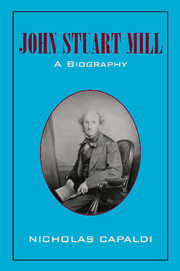Book contents
- Frontmatter
- Contents
- Preface
- Acknowledgments
- 1 Childhood and Early Education: The Great Experiment (1806–1820)
- 2 Company Man and Youthful Propagandist (1821–1826)
- 3 Crisis (1826–1830)
- 4 The Discovery of Romance and Romanticism (1830–1840)
- 5 The Transitional Essays
- 6 Intellectual Success (1840–1845)
- 7 Worldly Success (1846–1850)
- 8 Private Years (1850–1859)
- 9 The Memorial Essays
- 10 Public Intellectual (1859–1869)
- 11 Last Years (1869–1873)
- Notes
- Bibliography
- Index
2 - Company Man and Youthful Propagandist (1821–1826)
Published online by Cambridge University Press: 17 July 2009
- Frontmatter
- Contents
- Preface
- Acknowledgments
- 1 Childhood and Early Education: The Great Experiment (1806–1820)
- 2 Company Man and Youthful Propagandist (1821–1826)
- 3 Crisis (1826–1830)
- 4 The Discovery of Romance and Romanticism (1830–1840)
- 5 The Transitional Essays
- 6 Intellectual Success (1840–1845)
- 7 Worldly Success (1846–1850)
- 8 Private Years (1850–1859)
- 9 The Memorial Essays
- 10 Public Intellectual (1859–1869)
- 11 Last Years (1869–1873)
- Notes
- Bibliography
- Index
Summary
Career Path: India House
During the winter of 1821–22, some consideration was given to possible career choices. Mill describes the scene as follows: “My father, notwithstanding his abhorrence of the chaos and barbarism called English Law, had turned his thoughts towards the bar as on the whole less ineligible for me than any other profession.” What is clear from this description is that it was James Mill who was to decide on Mill's career. What is also clear is that the choice was a problematic one. The desirable career, from the point of view of both father and son, was a career in Parliament, but religious principles eliminated that possibility. An academic career would also involve a public commitment to religious principles that neither father nor son held. As late as 1839, Mill would decline offers of academic positions. A career in journalism was a natural choice, but it was rejected for two reasons: first, the Mills had already had enough experience with the financial strain of living by one's pen; second, financial pressures forced most journalists to sacrifice their integrity. A professional career of some kind seemed the most likely prospect. Given Mill's lack of manual dexterity, medicine would not have been a fortunate choice. That left the study of law as the least of the evils.
What reconciled the Mills for a time was a new neighbor at Queens Square, John Austin. During 1821, Mill read Blackstone and Roman law with Austin for several hours a day.
- Type
- Chapter
- Information
- John Stuart MillA Biography, pp. 35 - 54Publisher: Cambridge University PressPrint publication year: 2004



